新概念英语第一册第56课公开课
合集下载
新概念英语第一册L56
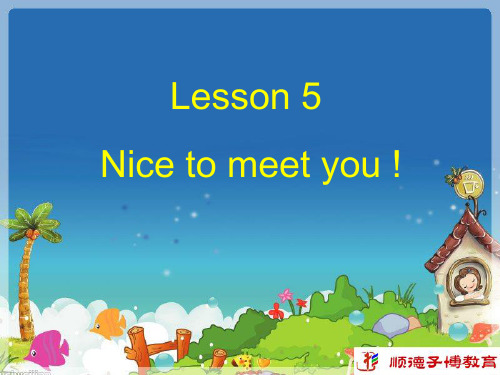
Chinese French
3
Ja panese
German
4
Korean Italian
5
American
English
6
• 先来听懂询问国籍的问题并回答 • What nationality are you ? • I am Chinese. • I’m Chinese .
7
如何询问“他”“她”的国籍呢
19
重点解析 2. he, she, it 的用法
Sophie is a new student. She is French. This is Hans. He is German.
Japanese car.
20
重点解析 3. 冠词 a , an 的用法:
fourteen eighteen
fifteen
nineteen
sixteen
twenty 24
Swedish
What make is the car? It’s a Volvo. It’s a Swedish car.
25
French
What make is the car? It’s a Peugeot. It’s a French car.
Swedish
French
German
Japanese34
Is Fiat a Chinese car or an Italian car? It’s a Chinese car.
35
Hans Chang-woo Luming Xiaohui
German
Korean
Chinese Chinese
Is Sophie a French student or a German student ? She’s a French student. She’s not a German student.
3
Ja panese
German
4
Korean Italian
5
American
English
6
• 先来听懂询问国籍的问题并回答 • What nationality are you ? • I am Chinese. • I’m Chinese .
7
如何询问“他”“她”的国籍呢
19
重点解析 2. he, she, it 的用法
Sophie is a new student. She is French. This is Hans. He is German.
Japanese car.
20
重点解析 3. 冠词 a , an 的用法:
fourteen eighteen
fifteen
nineteen
sixteen
twenty 24
Swedish
What make is the car? It’s a Volvo. It’s a Swedish car.
25
French
What make is the car? It’s a Peugeot. It’s a French car.
Swedish
French
German
Japanese34
Is Fiat a Chinese car or an Italian car? It’s a Chinese car.
35
Hans Chang-woo Luming Xiaohui
German
Korean
Chinese Chinese
Is Sophie a French student or a German student ? She’s a French student. She’s not a German student.
新概念英语第一册55-56-PPT课件

What do they usually do?
In the morning...... At noon...... In the afternoon...... In the evening...... At night......
Homework
Talk about your family
breakfast supper/dinner
The eating habits of Americans
美国人的饮食习惯
Breakfast
Breakfast time, the general in 8:00 They always eat baked bread, cereal and coffee,
3. At noon, who always eats lunch at home? Mr. or Mrs. Sawyer?
Mrs. Sawyer.
4. In the afternoon, what does Mrs. Sawyer usually do? What do they often do? She usually sees her friends. They often drink tea together.
到达……( 大地方) 到达……(小地方)
My father will arrive __i_n_ London tomorrow. I often arrive __/__home early in the evening.
Let’s read and remember the new words:
his wife watch television.
do one's homework 做作业
新概念英语第一册第55-56课件(共25张PPT)
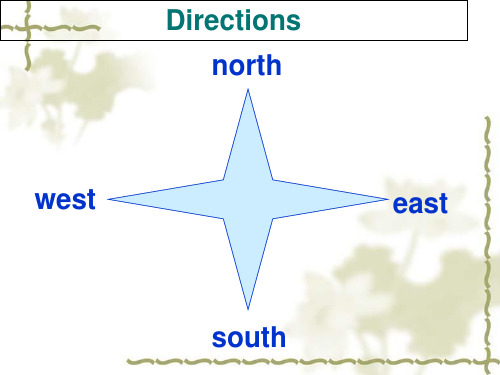
要加-s
表述客观规律或事实用一般现在时
The plane can fly in the sky. The earth goes around the sun. The book is yellow. He is tall. He is very smart! She is very beautiful!
谢谢观赏
You made my day!
我们,还在路上……
What do you usually do in the weekend? in your vacation?
Do some exercises: 1. ( c ) I often _____ up at 7:oo in the morning. My mother often
_____up at 6:30. A. get, get B. gets, gets C. get, gets D. gets, get 2. (B )Jim’s brother ____ in a factory. He usually _____ to work by car. A. work, go B. works, goes C. works, go D. work, goes 3. (A) ____ you always ____ basketball on Sundays? A. Do, play B. Does, play C. Are, playing D. Are, play 4. (D) _____ your father often____ TV in the evening?
Does she often do her homework at night?
Lesson 56 What do they usually do?
表述客观规律或事实用一般现在时
The plane can fly in the sky. The earth goes around the sun. The book is yellow. He is tall. He is very smart! She is very beautiful!
谢谢观赏
You made my day!
我们,还在路上……
What do you usually do in the weekend? in your vacation?
Do some exercises: 1. ( c ) I often _____ up at 7:oo in the morning. My mother often
_____up at 6:30. A. get, get B. gets, gets C. get, gets D. gets, get 2. (B )Jim’s brother ____ in a factory. He usually _____ to work by car. A. work, go B. works, goes C. works, go D. work, goes 3. (A) ____ you always ____ basketball on Sundays? A. Do, play B. Does, play C. Are, playing D. Are, play 4. (D) _____ your father often____ TV in the evening?
Does she often do her homework at night?
Lesson 56 What do they usually do?
新概念英语第一册第56课课件.ppt

瑞典的 法国的
德国的 日本的
韩国的 英国的
美国的 意大利的
如何询问汽车的品牌呢?
• What make is the car ? • It’s a German car .
• What make is his / her / your car ? • It’s an American car .
• nice
adj.
美好的
• meet
v.
遇见
• Japanese adj.&n. 日本人
• Korean adj.&n. 韩国人
• Chinese adj&n. 中国人
• too
adv.
也
如何表明国籍呢?
• I am French/German/Japanese/Korean.
• He/She is Chinese/Japanese/German.
NAOKO:
Nice to meet you.
MR. BLAKE: And this is Chang-woo. He's Korean.
CHANG-WOO:Nice to meet you.
MR. BLAKE: And this is Luming. He is Chinese.
LUMNቤተ መጻሕፍቲ ባይዱ:
Nice to meet you.
New Concept EnglishⅠ First Things Frist
Zoe
Everyday English
1.Follow me! 跟我来!/跟着我!
2. Take it easy. 放松点!/慢慢来!
3. Have a try! 试一下!
新概念英语第一册第56课件ppt

What make is it?
• 这句话中的make是名词词性,意思是 产品牌号。 所以这句话的意思是:它是什么牌子 的? 回答:It's a...
• 这句话中的it是代词,这个位置也可以 用其他的名词 例如:What make is this pen?
为深入学习习近平新时代中国特色社 会主义 思想和 党的十 九大精 神,贯彻 全国教 育大会 精神,充 分发挥 中小学 图书室 育人功 能
作业
• 背诵第五课课文,并继续熟练第一课 和第三课的背诵。
• 听写单词。 • 熟练运用本节课所讲解的日常用语。
• suit
n.
school
n.
• teacher
n.
• son
n.
daughter n.
•伞 •请 • 这里 •票 • 号码 • 对不起的 • 先生 • 衣帽间 • 一套衣服 • 学校 • 老师 • 儿子 • 女儿
为深入学习习近平新时代中国特色社 会主义 思想和 党的十 九大精 神,贯彻 全国教 育大会 精神,充 分发挥 中小学 图书室 育人功 能
• ③ adj. 使人高兴的,令人愉快的 It is so nice to have you here.
为深入学习习近平新时代中国特色社 会主义 思想和 党的十 九大精 神,贯彻 全国教 育大会 精神,充 分发挥 中小学 图书室 育人功 能
Nice to meet you!
• 在初次见面时可以说这句话,回答是: Nice to meet you,too.
选择疑问句
• 在两者或三者中进行选择,在一般疑 问句后用or进行连接。
• 选择疑问句词调一般是前升后降。 • 回答必须要用完整的句子回答。
例如:-Is she a teacher or a worker?
• 这句话中的make是名词词性,意思是 产品牌号。 所以这句话的意思是:它是什么牌子 的? 回答:It's a...
• 这句话中的it是代词,这个位置也可以 用其他的名词 例如:What make is this pen?
为深入学习习近平新时代中国特色社 会主义 思想和 党的十 九大精 神,贯彻 全国教 育大会 精神,充 分发挥 中小学 图书室 育人功 能
作业
• 背诵第五课课文,并继续熟练第一课 和第三课的背诵。
• 听写单词。 • 熟练运用本节课所讲解的日常用语。
• suit
n.
school
n.
• teacher
n.
• son
n.
daughter n.
•伞 •请 • 这里 •票 • 号码 • 对不起的 • 先生 • 衣帽间 • 一套衣服 • 学校 • 老师 • 儿子 • 女儿
为深入学习习近平新时代中国特色社 会主义 思想和 党的十 九大精 神,贯彻 全国教 育大会 精神,充 分发挥 中小学 图书室 育人功 能
• ③ adj. 使人高兴的,令人愉快的 It is so nice to have you here.
为深入学习习近平新时代中国特色社 会主义 思想和 党的十 九大精 神,贯彻 全国教 育大会 精神,充 分发挥 中小学 图书室 育人功 能
Nice to meet you!
• 在初次见面时可以说这句话,回答是: Nice to meet you,too.
选择疑问句
• 在两者或三者中进行选择,在一般疑 问句后用or进行连接。
• 选择疑问句词调一般是前升后降。 • 回答必须要用完整的句子回答。
例如:-Is she a teacher or a worker?
最新新概念第一册第55-56课课件精品课件
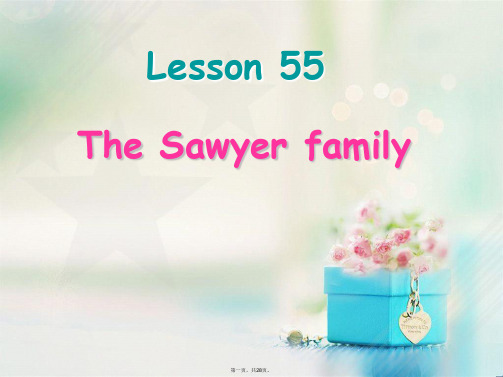
stays at home, does the housework
eats her lunch
sees her friends, drink tea together
come home from school, arrive home early
comes home from work,
arrives home late
将下列方框(fānɡ kuànɡ)中介词填到下面的题目中。
in, at, to, from
My
uncle the
stays ____ evening.
home
in
thaet
day
and
goes
to
work
___
He goes _____ work early and heincomes home ____ work
第三页,共28页。
[ 'iːvnɪŋ ]
[ lʌntʃ ]
[ naɪt ]
第四页,共28页。
lunch
午饭(wǔfàn)
evening
晚上(wǎn shang)
第五页,共28页。
live 住;生活(shēnghuó); 直播
The Sawyers live at 87 King Street.
第十六页,共28页。
写出下列动词的第三人称单数(dānshù)形式:
see__s_e_es give___g_iv_eslive____livewsatch_____
do____wawtachlke_s____dowesant____ wgaolk_s_____
shine_____ play_______
Lesson 55
eats her lunch
sees her friends, drink tea together
come home from school, arrive home early
comes home from work,
arrives home late
将下列方框(fānɡ kuànɡ)中介词填到下面的题目中。
in, at, to, from
My
uncle the
stays ____ evening.
home
in
thaet
day
and
goes
to
work
___
He goes _____ work early and heincomes home ____ work
第三页,共28页。
[ 'iːvnɪŋ ]
[ lʌntʃ ]
[ naɪt ]
第四页,共28页。
lunch
午饭(wǔfàn)
evening
晚上(wǎn shang)
第五页,共28页。
live 住;生活(shēnghuó); 直播
The Sawyers live at 87 King Street.
第十六页,共28页。
写出下列动词的第三人称单数(dānshù)形式:
see__s_e_es give___g_iv_eslive____livewsatch_____
do____wawtachlke_s____dowesant____ wgaolk_s_____
shine_____ play_______
Lesson 55
2019教育新概念英语第一册Lesson56(72张PPT)数学
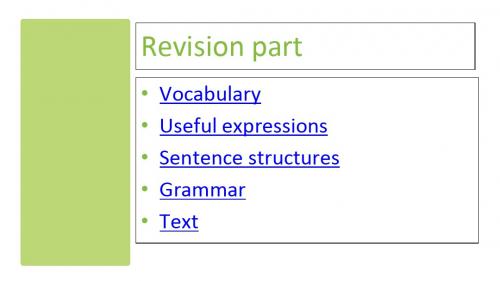
Is this your umbrella?
No, it isn’t.
Is this it?
Yes, it is. Thank you very much.
New Concept English 1
Lesson5 Nice to meet you.
New words – Lesson 5
• 1 Mr. ['mistə] 先生 • 2 good [gud] a.好 • 3 morning ['mɔ:niŋ] n.早晨 • 4 Miss [mis] 小姐 • 5 new [nju:] a.新的 • 6 student ['stju:dənt] n.学生 • 7 French [frentʃ] a.& n.法国人
name is Jack.
My coat and my umbrella please.
Here is my ticket.
Thank you, sir. Number five.
Here is your umbrella and your coat.
Sorry, sir.
This is not my umbrella.
• Now can you introduce your family ? • Family members. • Introduce one member who you like most.
Revision one Vocabulary
• Here is the example. • He is my father. • He is a farmer. • His hobby is cooking. • Every morning, he cooks porridge for
新概念第一册56课 PPT课件
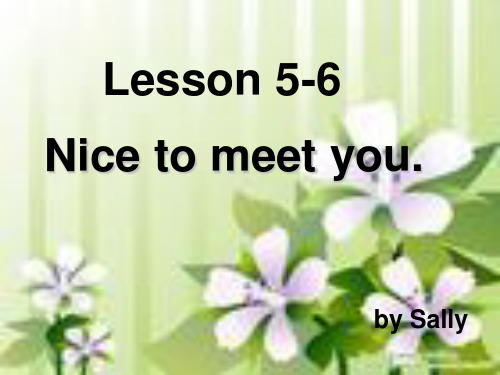
good luck
• Mr. 先生
Mr.用于男士的姓之前,不能单独使用,如课文 中的 Mr.Blake;而sir 一般单独使用,是对长者、 上司或男顾客的尊称,如:Sorry, sir. 对不起, 先生。
• Miss 小姐 一般用于指未婚女子,不过有时在不知道 对方是否已婚时也可使用.
26
不定冠词a
6
• French [frentʃ] adj.&n. 法国人 • German ['dʒə:mən] adj.&n. 德国人 • nice ['nais] adj. 美好的 • meet [mi:t] v. 遇见 • Japanese [ˌdʒæpə'ni:z] adj.&n. 日本人 • Korean [kə'riən] adj.&n. 韩国人 • Chinese [ˌtʃai'ni:z] adj&n. 中国人 • too [tu:] adv. 也
• 冠词数量上表示“一个”。冠词一共有 三个,分为不定冠词(a,an)和定冠 词(the)。
• 可数名词单数前面必须要用不定冠词。 a用在以辅音音素开头的名词前面 an 用于以元音开头的名词前面 例如:a pen an apple an umbrella an egg an hour a shirt
• ② adj. 和蔼的,友好的 He is very nice to his neighbours.
2. --Is this your umbrella? -- No, it D____ .
A. is B. not is C. my D. isn’t
3. – What is your name? –Pardon? --_A____
• Mr. 先生
Mr.用于男士的姓之前,不能单独使用,如课文 中的 Mr.Blake;而sir 一般单独使用,是对长者、 上司或男顾客的尊称,如:Sorry, sir. 对不起, 先生。
• Miss 小姐 一般用于指未婚女子,不过有时在不知道 对方是否已婚时也可使用.
26
不定冠词a
6
• French [frentʃ] adj.&n. 法国人 • German ['dʒə:mən] adj.&n. 德国人 • nice ['nais] adj. 美好的 • meet [mi:t] v. 遇见 • Japanese [ˌdʒæpə'ni:z] adj.&n. 日本人 • Korean [kə'riən] adj.&n. 韩国人 • Chinese [ˌtʃai'ni:z] adj&n. 中国人 • too [tu:] adv. 也
• 冠词数量上表示“一个”。冠词一共有 三个,分为不定冠词(a,an)和定冠 词(the)。
• 可数名词单数前面必须要用不定冠词。 a用在以辅音音素开头的名词前面 an 用于以元音开头的名词前面 例如:a pen an apple an umbrella an egg an hour a shirt
• ② adj. 和蔼的,友好的 He is very nice to his neighbours.
2. --Is this your umbrella? -- No, it D____ .
A. is B. not is C. my D. isn’t
3. – What is your name? –Pardon? --_A____
- 1、下载文档前请自行甄别文档内容的完整性,平台不提供额外的编辑、内容补充、找答案等附加服务。
- 2、"仅部分预览"的文档,不可在线预览部分如存在完整性等问题,可反馈申请退款(可完整预览的文档不适用该条件!)。
- 3、如文档侵犯您的权益,请联系客服反馈,我们会尽快为您处理(人工客服工作时间:9:00-18:30)。
例如:-Is she a teacher or a worker? -She isn't a teacher. She's a worker.
来做些练习吧~!
• -What make is your...... -It's a... 运用以上模板来做替换练习: watch,Swatch;telephone,Nokia; computer,Think Pad;coat,Only; television,Sony;chocolate,Dave; handbag,LV;ring,Jaff; handcream,Olay
• ③ adj. 使人高兴的,令人愉快的 It is so nice to have you here.
我是哪国人?
• 在说自己是哪一个国家的人时,使用句型: I’m...... 例如:I'm Chinese.
• 用以下单词来做一个替换练习吧! Franch,German,Japanese,Korean, Italian,American,Swedish,English
Lesson 5
Nice to meet you.
• 这是我的...... Here's my...
• 这个不是我的...... This is not my...
• 号码的表达方法 Number...
• 怎样介绍自己 My name is... I'm...years old. I'm from...
不定冠词a
• 冠词数量上表示“一个”。冠词一共有 三个,分为不定冠词(a,an)和定冠 词(the)。
• 可数名词单数前面必须要用不定冠词。 a用在以辅音音素开头的名词前面 an 用于以元音开头的名词前面 例如:a pen an apple an umbrella an egg an hour a shirt
Nice to meet you!
• 在初次见面时可以说这句话,回答是: Nice to meet you,too.
• 在初次见面时还可以说: How do you do. 回答也是 How do you do.
What make is it?
• 这句话中的make是名词词性,意思是 产品牌号。
上一节课的单词
• umbrella n.
• please
int.
•ቤተ መጻሕፍቲ ባይዱhere
adv.
• ticket
n.
• number
n.
• sorry
adj
• sir
n.
cloakroom n.
• suit
n.
school
n.
• teacher
n.
• son
n.
daughter n.
•伞 •请 • 这里 •票 • 号码 • 对不起的 • 先生 • 衣帽间 • 一套衣服 • 学校 • 老师 • 儿子 • 女儿
• What time is it? 几点钟了? It’s two o’clock.
作业
• 背诵第五课课文,并继续熟练第一课 和第三课的背诵。
• 背本课单词及专业词汇。 • 熟练运用本节课所讲解的日常用语。
单词学习
• Mr.
先生
• Miss
小姐
• good adj. 好
• morning n. 早晨
• new
adj. 新的
• student n. 学生
New words
• French adj.&n. 法国人
• German adj.&n. 德国人
• nice
adj.
美好的
• meet
v.
遇见
• Japanese adj.&n. 日本人
• Korean adj.&n. 韩国人
• Chinese adj&n. 中国人
• too
adv.
也
nice
• ① adj. 美好的,好看的 It’s a nice day today, isn’t it? That's a nice shirt.
• ② adj. 和蔼的,友好的 He is very nice to his neighbours.
所以这句话的意思是:它是什么牌子 的?
回答:It's a... • 这句话中的it是代词,这个位置也可以
用其他的名词
例如:What make is this pen?
选择疑问句
• 在两者或三者中进行选择,在一般疑 问句后用or进行连接。
• 选择疑问句词调一般是前升后降。 • 回答必须要用完整的句子回答。
练习2
• 看书上12页练习B This is Miss Sophie Dupont. French/(Swedish) Is she a French student or a Swedish student? She isn't a Swedish student. She's a French student.
日常用语--有关日期和时间
• What’s the date today? 今天是几号? Today is November first,nineteen sixty-three
• What month is this? 现在是几月份? This is January.
• What day is today? 今天是星期几? Today is Monday.
来做些练习吧~!
• -What make is your...... -It's a... 运用以上模板来做替换练习: watch,Swatch;telephone,Nokia; computer,Think Pad;coat,Only; television,Sony;chocolate,Dave; handbag,LV;ring,Jaff; handcream,Olay
• ③ adj. 使人高兴的,令人愉快的 It is so nice to have you here.
我是哪国人?
• 在说自己是哪一个国家的人时,使用句型: I’m...... 例如:I'm Chinese.
• 用以下单词来做一个替换练习吧! Franch,German,Japanese,Korean, Italian,American,Swedish,English
Lesson 5
Nice to meet you.
• 这是我的...... Here's my...
• 这个不是我的...... This is not my...
• 号码的表达方法 Number...
• 怎样介绍自己 My name is... I'm...years old. I'm from...
不定冠词a
• 冠词数量上表示“一个”。冠词一共有 三个,分为不定冠词(a,an)和定冠 词(the)。
• 可数名词单数前面必须要用不定冠词。 a用在以辅音音素开头的名词前面 an 用于以元音开头的名词前面 例如:a pen an apple an umbrella an egg an hour a shirt
Nice to meet you!
• 在初次见面时可以说这句话,回答是: Nice to meet you,too.
• 在初次见面时还可以说: How do you do. 回答也是 How do you do.
What make is it?
• 这句话中的make是名词词性,意思是 产品牌号。
上一节课的单词
• umbrella n.
• please
int.
•ቤተ መጻሕፍቲ ባይዱhere
adv.
• ticket
n.
• number
n.
• sorry
adj
• sir
n.
cloakroom n.
• suit
n.
school
n.
• teacher
n.
• son
n.
daughter n.
•伞 •请 • 这里 •票 • 号码 • 对不起的 • 先生 • 衣帽间 • 一套衣服 • 学校 • 老师 • 儿子 • 女儿
• What time is it? 几点钟了? It’s two o’clock.
作业
• 背诵第五课课文,并继续熟练第一课 和第三课的背诵。
• 背本课单词及专业词汇。 • 熟练运用本节课所讲解的日常用语。
单词学习
• Mr.
先生
• Miss
小姐
• good adj. 好
• morning n. 早晨
• new
adj. 新的
• student n. 学生
New words
• French adj.&n. 法国人
• German adj.&n. 德国人
• nice
adj.
美好的
• meet
v.
遇见
• Japanese adj.&n. 日本人
• Korean adj.&n. 韩国人
• Chinese adj&n. 中国人
• too
adv.
也
nice
• ① adj. 美好的,好看的 It’s a nice day today, isn’t it? That's a nice shirt.
• ② adj. 和蔼的,友好的 He is very nice to his neighbours.
所以这句话的意思是:它是什么牌子 的?
回答:It's a... • 这句话中的it是代词,这个位置也可以
用其他的名词
例如:What make is this pen?
选择疑问句
• 在两者或三者中进行选择,在一般疑 问句后用or进行连接。
• 选择疑问句词调一般是前升后降。 • 回答必须要用完整的句子回答。
练习2
• 看书上12页练习B This is Miss Sophie Dupont. French/(Swedish) Is she a French student or a Swedish student? She isn't a Swedish student. She's a French student.
日常用语--有关日期和时间
• What’s the date today? 今天是几号? Today is November first,nineteen sixty-three
• What month is this? 现在是几月份? This is January.
• What day is today? 今天是星期几? Today is Monday.
